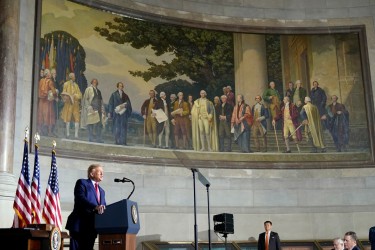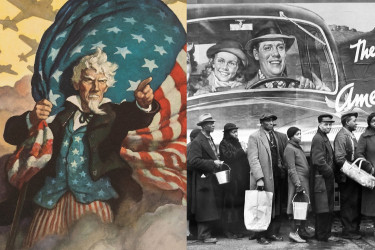What is revisionist history?
If you read history or engage with historians on social media, you may have seen the phrase “revisionist history” in replies or comments. Much of the time, this is meant as a criticism of the history being presented and the historians and organizations presenting it. But what does it mean? And is it a problem?
When used as a criticism in everyday conversation, “revisionist history” refers to conscious, intentional misstatements about things in the past, whether distant or recent. It can be used in the context of personal lives and relationships—the cause of an argument, for instance—or in political and cultural discussions. At the time I was writing this, for instance, it was being used in Twitter conversations about Tom Brady, Obama’s 2008 campaign strategy, and the Iran nuclear deal. Unlike saying someone is being forgetful or getting confused about what happened, accusing them of practicing “revisionist history” is accusing them of being a bad actor—a liar—by playing fast and loose with the past.
In most cases, accusing a historian of practicing revisionist history is accusing them of framing a historical figure, event, or narrative in a distorted and dishonest way in order to advance a particular social or political agenda. They’re accused of minimizing or even ignoring evidence that would disprove their argument—or prove the argument of those who disagree with them. Those invested in the term and its use often claim they are defending history from people who are trying to warp it or use it as a weapon.
Often these complaints boil down to the belief that the historical interpretation that an individual knows, whether commonly-held or niche, is the correct one, which means other interpretations offered by historians are incorrect. Those historians, it follows, must be very bad at thinking, intentionally distorting the process and product of historical inquiry, or both.
But for some who use “revisionist history” as a pejorative, the idea that history involves inquiry and interpretation is the problem itself. They’ll argue that they’re just looking at the evidence, not interpreting or “spinning” it like academic historians. History, for them, is just What Happened, its meaning easily accessed and understood by looking at a set of True and Complete Facts that has been assembled without human intervention.
If such a history existed, someone trying to change it in this way would be doing something dishonest. But I’ve never met a historian who thinks about history—either the process or the product—in this way. It’s just not what we believe about the past or how and why we study it.








